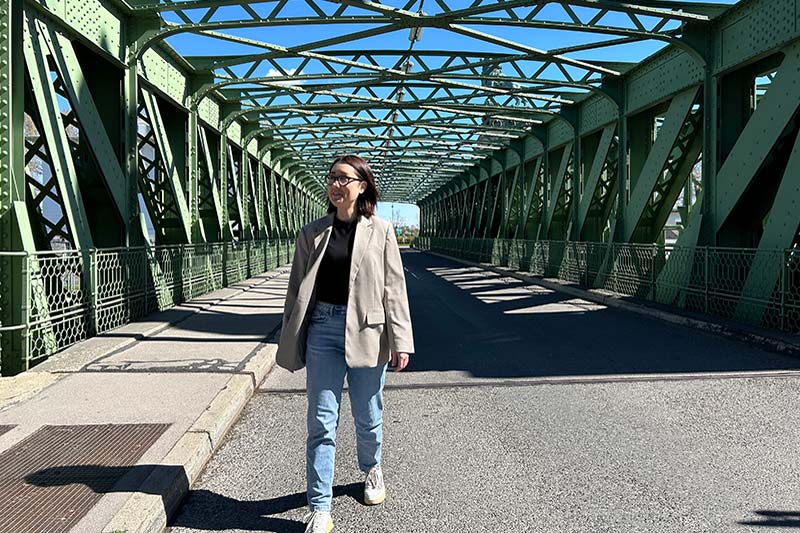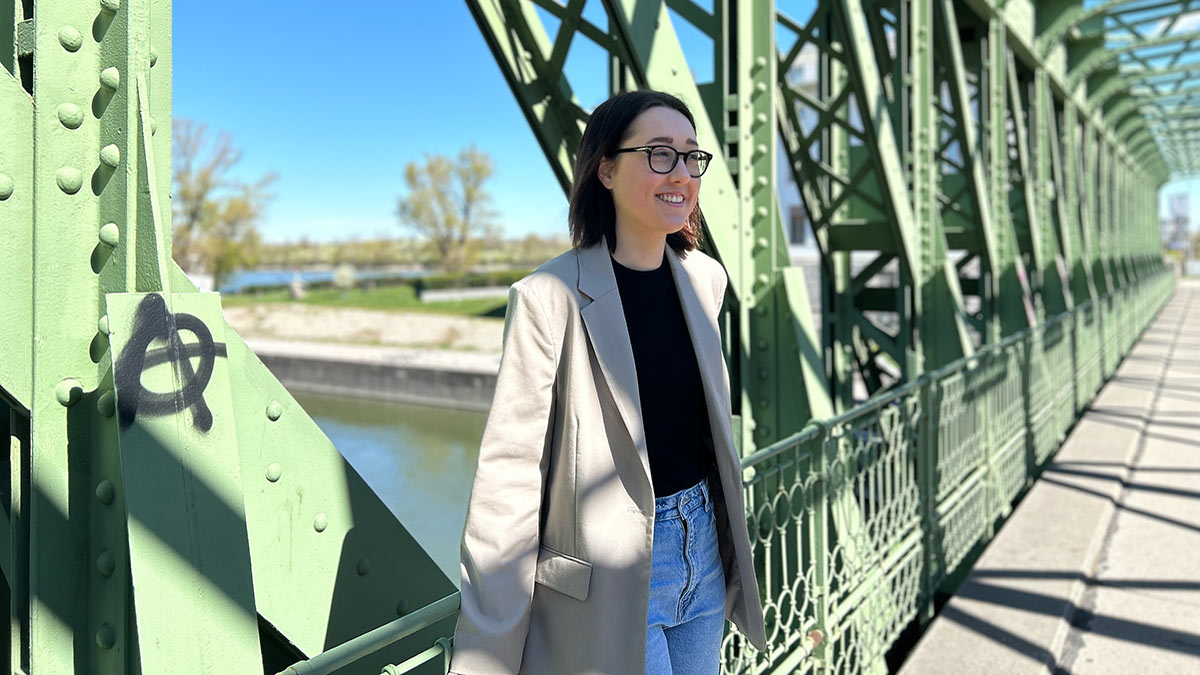History alum Anna Guenter was awarded top honors at the 14th Annual Texas A&M University History Graduate Student Conference, held February 9-10, 2024.
Guenter won the History Graduate Student Organization Paper Award for her research on Jewish identity in postwar Vienna. The award included a $250 cash prize.
Her paper, “Jewish Revenge in Postwar Vienna: Negotiating Jewish Identity and Reclaiming Home after Nazism,” was part of her MA thesis research for the graduate program in Missouri State’s Department of History.
The conference theme this year was “Navigating Crises and Resolutions.”
Conference experience validates effort
As part of a four-person panel titled, “Remembering the Holocaust,” Guenter presented her work, then fielded questions from the panel’s moderator.
“This was my first time presenting at a conference, so I was very nervous beforehand,” Guenter said. “However, it was a very rewarding experience and I felt incredibly validated in my efforts as an aspiring scholar.”
“Having the chance to meet other historians and getting to know their research was by far the best part of going to the conference,” she added. “It was so much fun talking to the people on my panel and hearing how passionate they were about their work.”
Research explores postwar Jewish revenge
Guenter’s thesis examines how postwar Jewish Holocaust survivors in Vienna, Austria, dealt with their experience through acts of revenge and revenge fantasies.
“I came to this topic because I had lived in Vienna before I moved to Springfield for grad school and had taken a specific interest in the city’s Jewish history,” Guenter said. “I got the idea to look at revenge after seeing an exhibition that focused on Jewish revenge as a means to reclaim agency—both as a literary trope and throughout history.”
“Jewish revenge has been, until recently, a relatively under-explored topic in Holocaust history,” said Dr. Sarah Panzer, Guenter’s thesis advisor at MSU. “Anna’s thesis represents an important intervention into our understanding of how individuals grappled with their ambiguous status as survivors in a country—and a city—which did not welcome them home, but rather held them at arm’s length as living reminders of an uncomfortable recent past.”
For the conference, Guenter opted to present an overview of two Holocaust survivors whom she discusses more thoroughly within the longer thesis project.
“[The moderator] was very interested in my thesis, and talking to him actually helped me think about aspects of my research that I had not previously considered,” she said.
An “emotional rollercoaster”
While Guenter said she is “generally good at separating myself from my research,” she admitted she was struck by her reaction to her research findings.
“I was surprised by how much of an emotional rollercoaster researching this topic and then writing this thesis was,” she explained.
Guenter spent a summer in Vienna searching archives for sources as part of her thesis research.
“Over the course of this research, I read dozens of Holocaust survivor testimonies,” she said. “And to be honest, I had completely underestimated the impact that would have on me.”
“Being so intensely focused on this made it harder to maintain distance,” Guenter continued. “I felt obliged to treat their [the survivors’] testimonies with the utmost respect and care.”
“But it also made me feel even more passionate about my research, because I wanted to understand how Jewish survivors managed to reclaim Vienna as their home after the Holocaust.”

History department provided supportive framework
During her time as a graduate student at Missouri State, Guenter said that she was constantly supported by the history department and singled out Panzer for praise.
“I can’t thank the department and specifically my thesis advisor, Dr. Sarah Panzer, enough for their support,” Guenter said.
“Starting my thesis felt incredibly overwhelming, and in the beginning I only had a vague idea of how I wanted to approach this project,” Guenter explained. “But having regular meetings with [Panzer] and receiving her feedback on my progress was instrumental in getting the actual work done and also not [losing] hope in the process.”
Panzer was equally complimentary in her remarks on Guenter, describing her as “extremely conscientious and thoughtful.”
“I had the pleasure of having her work for me as a research assistant for two semesters,” she explained, describing how Guenter completed tasks such as transcribing Sütterlin script (a historical form of German handwriting), compiling bibliographies and constructing a digital database.
“She was an asset to me personally, and to the department, and we were sorry to lose her,” Panzer said. “But I know that she has an extremely bright future ahead of her as a future colleague.”
As Guenter now prepares her doctoral dissertation proposal for graduate school applications, she credits the supportive environment at Missouri State with helping her grow as a scholar.
“I think there are plenty of people who are willing to help you out and who want to see you succeed, so establishing a support network early on is really helpful,” she said.
“So far, I have had overwhelmingly positive experiences in this regard, and I am incredibly grateful to the people that I have pestered with questions over the years.”
Explore opportunities in history
Photos by Josefine Kracht.

